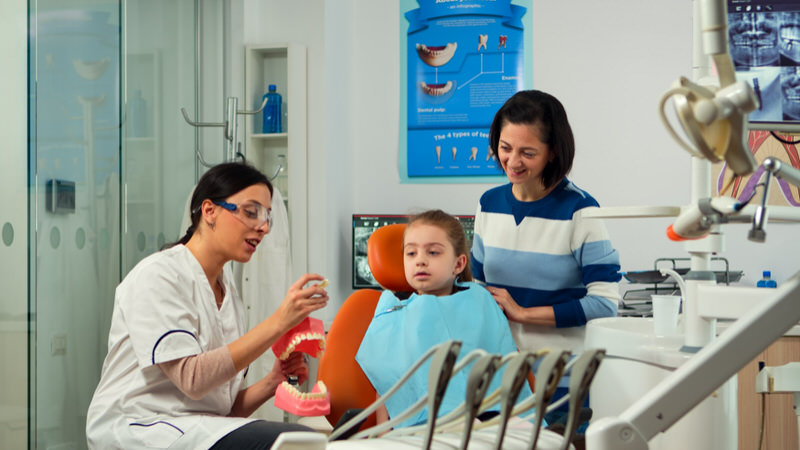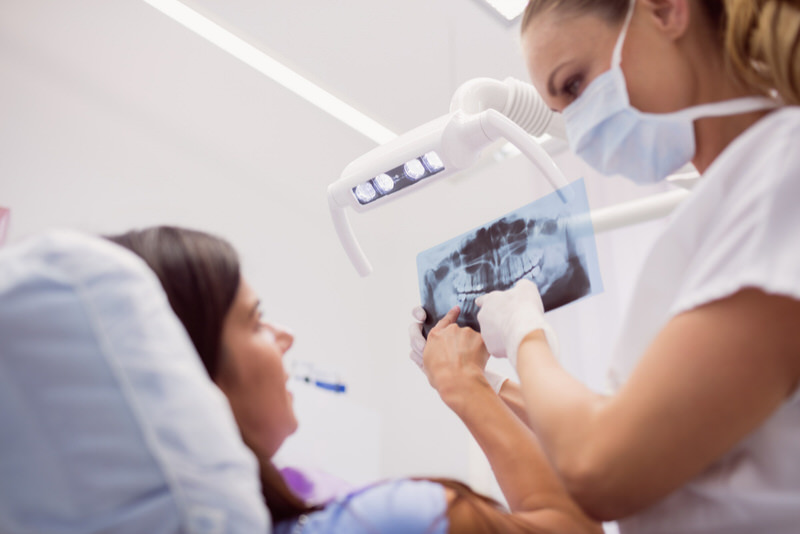First of all, let’s be clear that your permanent or adult teeth are not growing back like your baby tooth. Second, you don’t pull out an adult tooth on your own because it’s going to be extremely painful, and it would probably damage parts of your gums. You want a dentist to do this for you. In cases where it was accidentally pulled out, you need to get the tooth, gently rinse it with water or saliva, and put it back in the socket. If that’s not possible, just don’t let the tooth dry out and soak it in milk or saliva (not water) until you get to your dentist.
If a dentist is not available in the next hour or so, it’s completely fine as long as you keep the tooth moist.
Hold it in the crown (the part we use to chew) and do not touch the root.
If ever the tooth went beyond saving, there are other options to fill the gap in your mouth where the tooth used to be. It is best to talk to your dentist about it and be honest about your concerns.
Difference between baby and adult tooth

On average, babies grow their first tooth at around 6 months of age, sometimes earlier or later, and continue until all their baby teeth (20 baby teeth) are out.
Then at around 5-6 years old, they will start to lose these baby teeth in exchange for 32 permanent teeth.
The earlier you grow your first tooth, the earlier you lose them and get your permanent set of teeth.
Visible differences between baby and permanent teeth
- Color – Permanent teeth appears to be more pale compared to baby teeth.
- Edges – The crown of baby teeth are more smooth and gentle where permanent teeth do have zigzagged margins known as mamelons, it help the teeth tear through the gums when they are erupting into the oral cavity.
- Number of teeth –
- The primary teeth are 20 in total, which include:
- Four lateral incisors
- Four central incisors
- Four second molars
- Four first molars
- Four cuspids (canine teeth)
- While the permanent teeth, has 32, including:
- Four third molars (wisdom teeth)
- Four second molars (12-year molars)
- Four first molars (six-year molars)
- Four central incisors
- Four lateral incisors
- Four canines
- Four first premolars
- Four second premolars
- The primary teeth are 20 in total, which include:
Reason to remove permanent teeth

Our permanent teeth could last a lifetime, but some uncontrollable reasons might lead to a need for tooth extraction of permanent teeth.
It’s highly recommended that you have a professional, your dentist does the extraction procedure to avoid possible complications if not done correctly.
1. Tooth damage due to decay
Extraction is not the first option your dentist would give you. They will try to save a tooth as much as possible, but if the decay reaches the center of the tooth, which is the pulp, the bacteria produced by the decay can invade the pulp and cause an infection.
The tooth will then need to be removed to avoid more damage and save you from painful episodes.
2. Periodontal disease
It’s an infection of the gums, periodontal ligaments, alveolar bone, and other structures surrounding the teeth.
The earliest stage of periodontal disease is gingivitis which is an infection of the gums. The more severe kind of periodontal disease affects the periodontal ligaments and the alveolar bone.
In some cases, periodontal disease may result in the loosening of a tooth. When this happens, tooth extraction is a possible dental option.
3. Teeth overcrowding
The extraction of one or a few teeth may be needed to avoid overcrowding in the mouth.
This is also recommended when the patient needs to undergo orthodontic treatment, and there is no room for the teeth to move and realign.
4. Impacted tooth
It’s when a tooth is blocked from coming out or when the gums do not fully erupt, preventing the tooth from coming out; this is usually the case for wisdom teeth.
Your dentist may recommend the extraction of the impacted tooth to prevent it from damaging other teeth, which will also help lower the risk of infection and overcrowding.
5. Accident
For incidents where a patient will need dental treatments, the first option is to preserve the teeth as much as they can.
Dental bonding, crowns, bridges, or veneers may be recommended. However, if the dental issue is beyond repair, extraction is required.
What to do after a tooth extraction?
Having your tooth or teeth extracted could restrict you from eating and doing things to ensure faster and safer healing of the gums.
Your dentists will usually give you these reminders after they are done with the procedure and make sure that you take it seriously.
Here’s a list of the things that you need to keep in mind after tooth extraction:
- Take prescribed medicine – Your dentist will give you a list of medicine including painkillers and if needed in some instances antibiotics. Make sure to take them as prescribed to avoid infections or complications.
- Ice for swelling – Apply an ice bag to the affected area immediately after the procedure to keep down swelling. Apply ice for 10 minutes at a time. You might also want to prop your head with pillows when lying down. Lying flat may prolong bleeding.
- Relax – Limit your activity for the next day or two with controlled movements to minimize bleeding. Avoid rinsing or spitting forcefully for 24 hours after the extraction to avoid dislodging the clot that forms in the socket.
- Eat soft foods – Stick with foods that don’t require too much chewing to allow the gums to heal, gradually add solid foods to your diet as the extraction site heals. Do not drink from a straw for the first 24 hours, also avoid smoking, which can make your healing take longer.
FAQs
Can I pull out my own tooth?
Yes, technically you can, but it’s not a good idea because, for several reasons, it is highly recommended for you to let a professional handle tooth extraction especially permanent teeth. It will also be extremely painful, unlike when your baby tooth falls off.
Why do permanent teeth become loose?
There are several reasons why an adult tooth would wiggle or become loose. It could be because of underlying medical causes, like gum disease resulting from poor oral hygiene, build-up of dental plaque, or sudden injury or accident.
Conclusion
Your dental health is as vital as your general health. Regular brushing, flossing, and visits to your dentist play a significant role in avoiding unnecessary infections or complications as well as preventions for dental issues that might arise.


